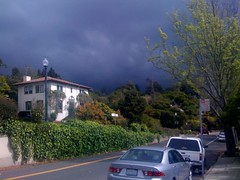
|
|||||||||||||||||||||||||||||||||||||||||||||||||||||
|
AP is fighting last century's battle
That said, it took me a while to come to some conclusions on their mysterious new "strategy" for doing online news. Here they are, in no particular order. 1. It's a Hail Mary pass. Financially, things are looking terrible at AP -- as at other news organizations. There's a general downward trend in the economics of news, and that's amplified by the downturn in the economy. If we could see AP's balance sheet, we might conceive of something desperate ourselves. 2. So their response, near as I can tell, is to renegotiate their deal with the Internet, Google primarily, and change the unit of content they share. Instead of it being a "story" they want to share topics, much like Mahalo. And it's likely to work as well as Mahalo, which is to say, not at all. Here's why. Google is a search engine for people, and people know what they're looking at when they see an SEO-optimized page. They correctly conclude the page wasn't designed for them and hit the Back button. Google, whose indexing algorithm does its best to emulate a human being, isn't fooled by such simple attempts to fool it. Maybe at first, but they soon catch up. You don't see many Mahalo pages in the top search results on Google, and you won't see many AP category pages either, nor should you. Yesterday, Google CEO Eric Schmidt told the news people to think about their users and what serves them. He was giving them good advice, and it's likely advice he gives his own people, including the people who write their search algorithms.
4. I've said it many times before, no one seemed to hear, so I'll try again. Focus on what you love about news, and then bring more of that to the insatiable users of news. If you're making people happy, they'll find a way to keep you doing it. It's like Napster in 2000, the music industry was complaining while millions were freshly excited about music, for the first time in 25 years. People were talking about music on airplanes, in supermarkets. There had to be a way for them to make huge money from that, instead they tried to stop it. AP -- same thing, now in 2009. We love news. We don't love what the cable networks are providing us. The papers are folding. Get on top of the Internet, don't try to crawl under it. Best advice I can offer. |
"The protoblogger." - NY Times.
"The father of modern-day content distribution." - PC World.
One of BusinessWeek's 25 Most Influential People on the Web. "Helped popularize blogging, podcasting and RSS." - Time.
"The father of blogging and RSS." - BBC.
"RSS was born in 1997 out of the confluence of Dave Winer's 'Really Simple Syndication' technology, used to push out blog updates, and Netscape's 'Rich Site Summary', which allowed users to create custom Netscape home pages with regularly updated data flows." - Tim O'Reilly.
My most recent trivia on Twitter. On This Day In: 2008 2007 2006 2005 2004 2003 2002 2001 2000 1999 1998 1997. |
||||||||||||||||||||||||||||||||||||||||||||||||||||
|
© Copyright 1997-2009 Dave Winer. Previous / Next |
|||||||||||||||||||||||||||||||||||||||||||||||||||||
 First, I've had very good experiences, personally, working with the top people at Associated Press. They sponsored the third BloggerCon at Stanford in 2004. They, along with AFP, have generously given me access to their photo flow as part of an experimental project. I have advised them, at no charge, on RSS and podcasting. So I'm pre-disposed to like them, and to defend them, even though many of my colleagues in the blogging world are less considerate.
First, I've had very good experiences, personally, working with the top people at Associated Press. They sponsored the third BloggerCon at Stanford in 2004. They, along with AFP, have generously given me access to their photo flow as part of an experimental project. I have advised them, at no charge, on RSS and podcasting. So I'm pre-disposed to like them, and to defend them, even though many of my colleagues in the blogging world are less considerate. 3. But -- even if somehow they could fool Google's algorithms, Google is already undermined by the real-time web. I think they see it, I hate to say I Told You So, but I've been writing about this since 1996, when I called for
3. But -- even if somehow they could fool Google's algorithms, Google is already undermined by the real-time web. I think they see it, I hate to say I Told You So, but I've been writing about this since 1996, when I called for 


